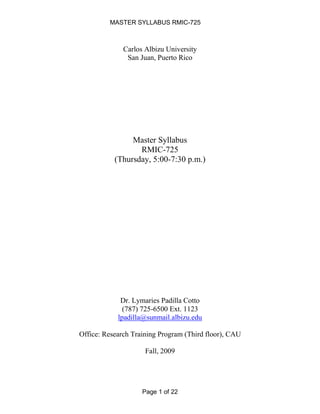This document provides the syllabus for an introductory scientific research methods course at Carlos Albizu University. The course introduces students to both quantitative and qualitative research approaches across 15 units. Key topics covered include the scientific method, research design, variables, sampling, validity, reliability, and writing a research proposal. Students are evaluated based on exams, research proposals, presentations, and participation. The goal is for students to understand and apply fundamental research concepts and to develop skills in planning, conducting, and critically analyzing quantitative and qualitative research studies.





















